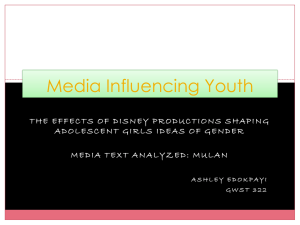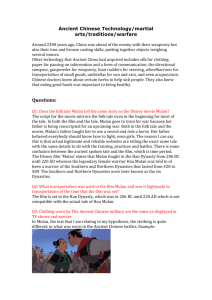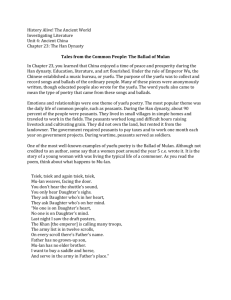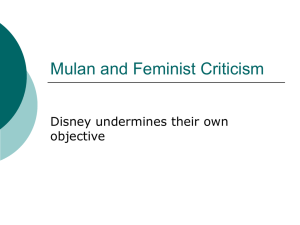Feminist Critique of Mulan
advertisement
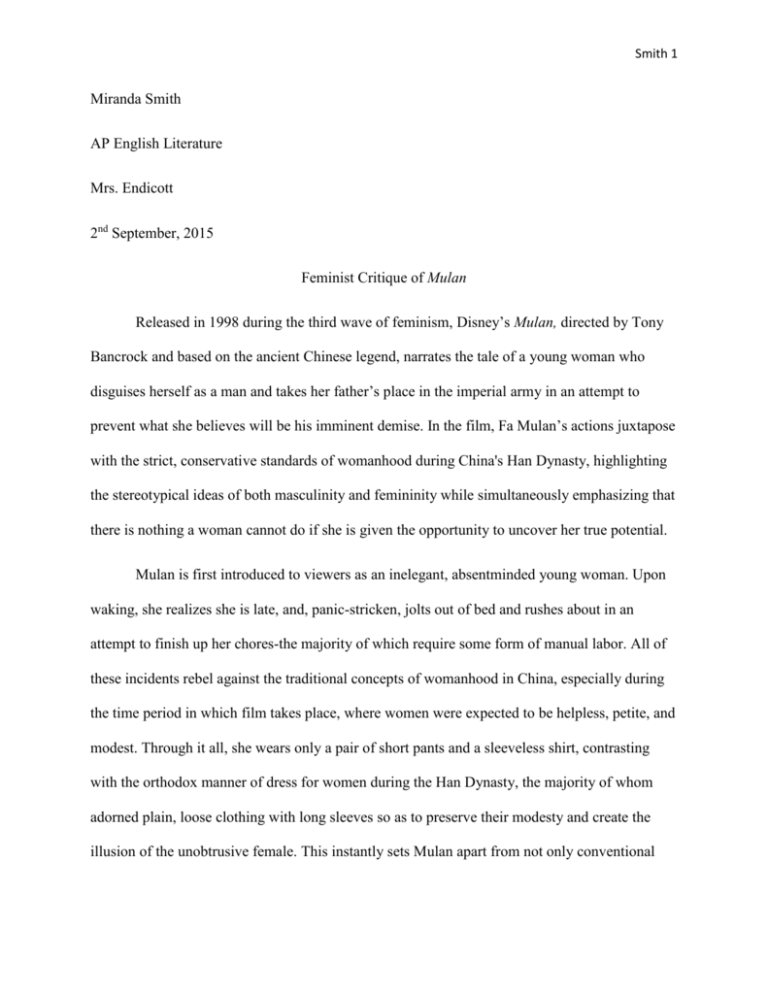
Smith 1 Miranda Smith AP English Literature Mrs. Endicott 2nd September, 2015 Feminist Critique of Mulan Released in 1998 during the third wave of feminism, Disney’s Mulan, directed by Tony Bancrock and based on the ancient Chinese legend, narrates the tale of a young woman who disguises herself as a man and takes her father’s place in the imperial army in an attempt to prevent what she believes will be his imminent demise. In the film, Fa Mulan’s actions juxtapose with the strict, conservative standards of womanhood during China's Han Dynasty, highlighting the stereotypical ideas of both masculinity and femininity while simultaneously emphasizing that there is nothing a woman cannot do if she is given the opportunity to uncover her true potential. Mulan is first introduced to viewers as an inelegant, absentminded young woman. Upon waking, she realizes she is late, and, panic-stricken, jolts out of bed and rushes about in an attempt to finish up her chores-the majority of which require some form of manual labor. All of these incidents rebel against the traditional concepts of womanhood in China, especially during the time period in which film takes place, where women were expected to be helpless, petite, and modest. Through it all, she wears only a pair of short pants and a sleeveless shirt, contrasting with the orthodox manner of dress for women during the Han Dynasty, the majority of whom adorned plain, loose clothing with long sleeves so as to preserve their modesty and create the illusion of the unobtrusive female. This instantly sets Mulan apart from not only conventional Smith 2 Chinese women, but the helpless, standard Disney heroines who preceded her, establishing her as a revolutionary who defies conventional gender roles. As she is performing her household duties, Mulan’s father reminds her that she has an appointment with the village Matchmaker. She quickly dresses and meets her mother and grandmother with seconds to spare. The two fuss over Mulan’s messy hair and disheveled clothing, ignoring her explanation and chiding her for not taking the time to make herself more presentable. Embarrassed, Mulan demurs, walking into her appointment while reminding herself to be quiet, poised, and graceful. This reaction parallels directly with today’s culture, where women are constantly reminded-both by society and themselves- to behave in a manner suitable to their gender roles, marking the introduction of female stereotypes in the film. An inability to conform to these rigid stereotypes can result in undesirable consequences; in Mulan’s case, her behavior causes tension amongst her parents and worries her father, who prays she will find a way to “impress the Matchmaker” despite her boisterous personality. These stereotypes are reinforced in the following scene, in which Mulan is reinvented by the Matchmaker, and-along with the other hopeful, young females-performs “Bring Honor to Us All.” The song states attributes such as “a tiny waist,” and being “obedient” are what constitutes femininity in Mulan’s culture. As well, it implies that women who do not possess these traits risk disgracing their families or damaging their reputation, an important concept not just during the Han Dynasty, but in today’s society as well. Furthermore, the constant emphasis of the lyrics “please bring honor to us all” serves to convince women of the necessity of sticking to their gender roles, warning them that failure to do so will reflect not just on them, but their loved ones as well. In correlation with this, Mulan’s failed meeting with the Matchmaker is a direct result of her inability to fill her envisaged typecast, highlighting her almost unconscious rebellion against Smith 3 social norms. This failure results in intense feelings of shame, a phenomenon many women in today’s society are still struggling to overcome and accept. Distraught, Mulan flees back to her home, disgustedly removing the thick makeup applied by the matchmaker, thereby abandoning all female stereotypes thrust upon her and reverting back to her true self. Examining her reflection, she then concludes this is unacceptable, as “if [she] were to truly be [herself], it would break [her] family’s heart.” This reveals to viewers that throughout her life Mulan has tried to conform to gender roles and maintain her honor not for herself, but out of a sense of obligation to her family, once again emphasizing the pressure society places on individuals to follow gender norms. This corresponds to females in today’s culture who exhibit masculine or individualistic traits. These women face a similar battle to Mulan, as they, too, struggle to reconcile their idea of who they are and the person they want to become with the person society says they have to be, which leads many females to develop feelings of confusion or a sense of inferiority towards their male counterparts. During all of this, the Huns, a barbaric army led by Shan Yu, have managed to successfully breach China’s borders and are rampaging the empire in an attempt to seize control. Deciding the nation will need all the manpower possible at its disposal if it hopes to drive out these invaders, the Emperor calls upon his citizens to form reserves and aid the imperial army in the battle; he decides that one man from each household must join the cause. It is unsurprising that the Emperor’s choice for these new recruits are men, as the strict gender norms present in this ancient society mandated that men act as the stronger sex, and therefore society viewed them as the embodiment of strength and courage-both of which are important traits for individuals engaged in war to possess. While the men are forced to leave their homes and families behind to fight, the women were expected to stay confined to the safety of their households and care for Smith 4 their children. This not only reinforces the intransigent stereotypes presented at the beginning of the film, but reflects the idea of Republican Motherhood as well. Though introduced in the 17th century, the concept was only just being accepted-for the most part- as an outdated practice during the late 1900s, when Mulan was released. It refers to the belief that a woman’s place was in her home, maintaining the family sphere; without this compliance from females the running of the republic would be impossible. Much like their counterparts in Mulan, these women, many of whom had been inevitably exposed to political goals and strife, were granted in accordance to their gender roles an acceptable means for them to contribute to their nation. As the social constructs set in place during each of the two respective time periods rendered both groups incapable of dreaming of something more, the majority of them eagerly accepted their roles, implying that if society deems a particular gender norm acceptable then so will many of the targeted individuals, which in turn highlights the detrimental effects years of oppression and unfair expectations has on a woman’s psyche and behavior. One of the many men called to take up arms and join the war effort is Mulan’s father, Fa Zhou. Horrified at the prospect of her father, crippled from the last war, being sent out to fight with much younger, virile men, she rushes forward, pleading with the recruiter to spare him. The two men are shocked at her outburst, and, scandalized, they inform her that she is to “hold her tongue in a man’s presence.” This implies that women are inferior to men, and that as a result their opinions are not taken into consideration; in other words, they are literally silenced by a male dominated society. Shamed, her father turns from her, claiming she has dishonored him. This proves to be a pivotal moment for Mulan, as she finally understands that there are much more important things to worry about than sticking to her civilization’s gender roles, specifically family and compassion. Later that night, still reeling from this epiphany, Mulan steals her Smith 5 father’s draft letter, cutting her hair in a boyish style before adorning his armor and sneaking away to take his place in the army’s training camp. This act of rebellion symbolizes Mulan’s decision to finally fully abandon the female stereotypes that hitherto had plagued her for her entire life, introducing her new, hybrid identity and allowing her the chance to discover her true sense of self society had worked so long to purge from her. As she makes her way to the camp, Mulan’s actions are observed by her ancestors, who react with outrage and embarrassment. They scoff, referring to her as a “troublemaker” and “a crossdresser” before deciding something must be done to stop her, else she will embarrass the family or get herself killed. Such a harsh reaction from individuals who lived centuries before Mulan highlights the fact that gender norms are merely social constructs set in place thousands of years ago, and that they are only kept in place because of the acceptance and dependence exhibited towards them by society’s older generation, such as Mulan’s ancestors. As well, seeing that such unforgiving judgement can be dished out by family, the people who should show understanding and unconditional love, explains the anxiety and lack of acceptance and acknowledgement for oneself exhibited not only by Mulan, but today’s youth as well. Mushu, a small, feisty dragon who functions as the gong ringer for the Fa family’s ancestors, is tasked with finding Mulan and bringing her back home. He instead decides to mentor her, encouraging her and advising her on how to behave in a more masculine manner. He does so not out of kindness, or even a sense of duty, but because he thinks that by molding her into a war hero, he will finally prove his worth to the ancestors and become the family guardian, a title he lost after his misguidance resulted in the death of one of his charges. This relates back to women in today’s society, who are built up and given hope by others-especially men-only to have this hope crushed when these individuals attempt to take advantage of them for power or Smith 6 sex, or they find that despite the encouragement offered by some, society as a whole is still unwilling to accept them for who they truly are. Mulan and Mushu arrive at the camp together, where, almost immediately, trouble ensues. Captain Li Shang is furious, and makes an example out of Mulan-who now goes by Pingcausing the rest of the recruits to resent her. The following day marks the beginning of training, where Shang grows discouraged, and asks himself “Did they send me daughters, when I asked for sons?” This comment prompts shame from the male recruits, who, now more determined than before, follow their captain as he leads them in extensive workouts and sings “I’ll Make a Man Out of You.” In the song, Shang states that in order to be a man one must be “as swift as the coursing river” and have “the force of a great typhoon,” emphasizing male stereotypes. As well, the song insinuates that women can possess none of these things, an insinuation that is soon proven incorrect as the film continues to portray Mulan as the antithesis to the traditional idea of womanhood. She is obviously the most determined recruit, and as a result she is soon revealed to be the only one to impress Shang by possessing all of the traits of the “ideal man.” Ironically, she is also the only recruit who is not a man, a feat which proves that gender norms are restrictive and can prevent women form realizing their true potential. Furthermore, this proves that gender norms are taught, and therefore should be perceived as flexible, as not everyone is confined to these rigid molds. As Mulan continues to defy stereotypes, her fellow recruits notice her capability and begin to leave behind their old resentments. She soon forges friendships with three of her fellow soldiers, Ling, Chien-Po, and Yao, who, after apologizing, begin discussing what they look for in a woman in an attempt to distract themselves from the boredom and trials of war, leading the other recruits in a performance of “A Girl Worth Fighting For.” In it, they state that they want a Smith 7 woman who is “pale” and that they care more about “what she cooks like” than her intelligence, showcasing the effect societal expectations has on what men look for in women. All of these things juxtapose with men’s expected masculinity, making the differences between the two sexes that much more obvious while also showcasing that what a man desires more than anything is a woman who makes him appear more masculine. When prompted to state what she would look for in a woman, Mulan hesitantly replies “a woman who speaks her mind.” A trait she, herself, possesses, Mulan’s statement is instantly dismissed, showing that even now, after everything she has done and proven to herself, it is still nearly impossible to persuade other individuals to disregard the gender roles that bind them. Soon after this, General Shang receives word from his father of a Hun sighting. There, he discovers his father’s army has been slain. While taking a moment to mourn his loss, Mulan is the only one to vocalize her sympathy, an action that appears to be feminine in nature, but that she makes appear natural to the masculine persona she has adopted. This shows that she is growing more comfortable with her current role, and has melded certain aspects of the two gender roles into the person she is beginning to grow into. While leaving, Mushu, who is hiding in Mulan’s saddlebag, accidentally sets off a rocket. This alerts the Huns to the army’s location, forcing them to engage in a battle for which they are both outnumbered and ill prepared. In the ensuing chaos, Shang is hit by a stray arrow and later swept away in an avalanche. Mulan comes up with a plan that takes care of the entire Hun army, and after realizing her captain is in trouble, risks her own life to save him, proving that regardless of expectations, a woman can possess superior strength and cleverness. As Shang is thanking Mulan for rescuing him, she collapses, and he notices she has been stabbed. He commands his troops to set up camp, and tends to Mulan. He and the rest of the Smith 8 soldiers soon realize Mulan is a woman, and they react with disbelief. She is told she has “brought dishonor,” but after all she has been through realizes this is not true and ignores the remark. She instead attempts to explain herself to Shang, who, in this particular time period, had every right to have her killed for her subterfuge. Instead, he spares her life because she saved his, claiming that his debt is repaid before casting her away. The reaction from the men in Mulan’s camp is not only a result of outrage over the defiance of gender roles, or even a sense of betrayal; more than anything, the men’s reaction stems from their wounded pride. They are embarrassed that no other recruit-all of which are men-was able or willing to behave in a manner as brave and clever as Mulan, highlighting once again the potential hidden inside of every woman while also showing how insecure this can make men, thus explaining-but by no means excusing- their horrific oppression and subjection of females. As Mulan lies crumpled in the camp where Shang and her former friends left her, she looks at Mushu and states, “Maybe I didn't go for my father. Maybe what I really wanted was to prove I could do things right. So when I looked in the mirror I'd see someone worthwhile.” This reveals that taking her father’s place in the army was not just to save his life, but to save Mulan from the austerity of her society as well, proving just how redemptive and life changing defying stereotypes and unveiling one’s true self can be. As she begins her journey home, Mulan and Mushu discover that the Hun army is still alive. Despite being ostracized, Mulan knows she must do what she can to help, and rushes to the Emperor’s home where the country is celebrating the defeat of the Huns. There, she informs Shang of what she saw, only to be dismissed as a liar. She is indignant, and demands to know why he could trust Ping, but not Mulan. This emphasizes how something as trivial as gender can alter one’s perception, highlighting the ridiculousness of the matter. When she receives a similar Smith 9 reaction from the citizens in the audience, she enlists the help of Ling, Chien-Po, and Yao, who decide they value her friendship regardless of her gender. As Mulan and Shang-who has decided she is right-fight Shan Yu, the three other men dress as females in an attempt to distract the evil general’s henchmen, showing, much as Mulan did in the beginning of the film, an understanding that there are more important things in life than conforming to gender roles. This also shows that all it takes is one person rebelling against these gender roles to start a chain reaction and encourage others to do the same. Her friends’ distraction gives Mulan the edge she needs to finally defeat Shan Yu once and for all, thereby saving her country and gaining the respect of not only Shang, but the Emperor and all of China as well. Furthermore, this act once again proves the capability of Mulan and women everywhere, showing her last act of rebellion against the social bonds established by the Han Dynasty’s conservative society. This act of rebellion proves that despite the beliefs of her patriarchal society, the rejection of gender roles will not result in the ruination or disruption of humanity; in fact, the unequivocal implication of Mulan is that, as demonstrated in this final scene, gender parity has the potential to not only prevent the downfall of civilization, but also enable women to find peace with themselves and their place in the world.




